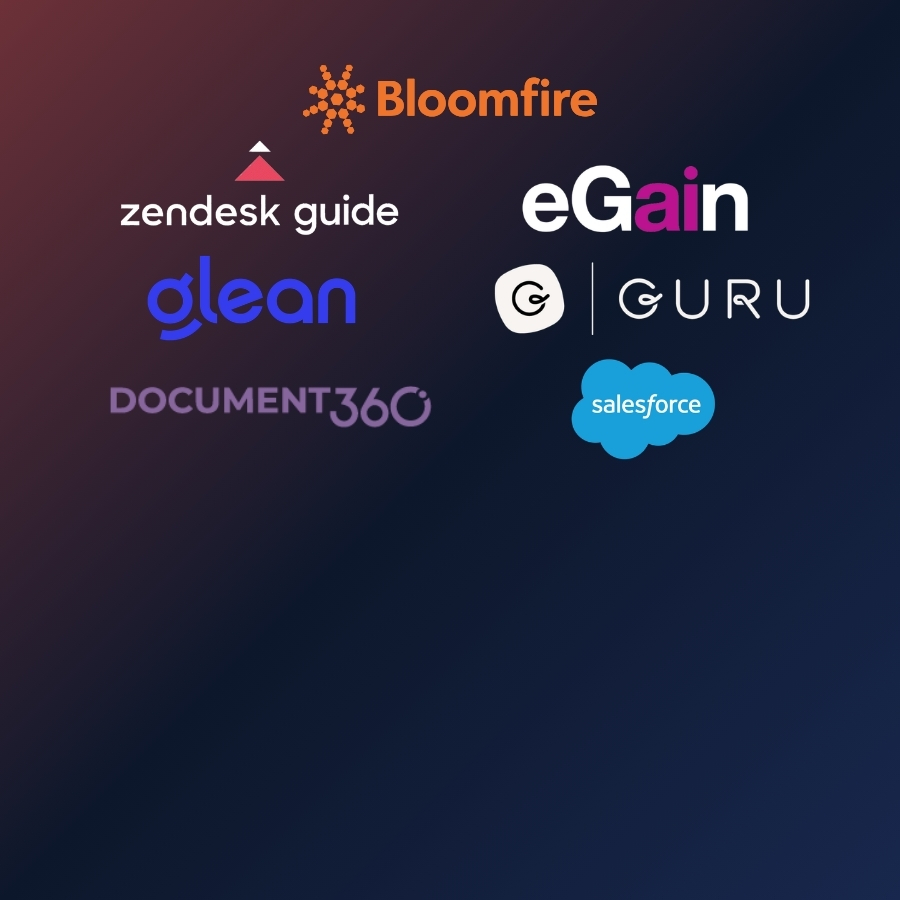Sales Enablement Content That Should Live in Your Knowledge Base

Dig into just about any recent study on sales performance and you’ll find plenty of cause for concern. On average, only 54.6 percent of sales reps are meeting their quotas, according to CSO Insights. Qvidian cites data that puts the number at just 50 percent, year after year. And many sources point to SiriusDecisions’ finding that 54 percent don’t meet their quotas. The extent of the problem may depend on who you ask, but we can all agree the news isn’t good.
Of course, there are a number of factors that impact sales performance. But many observers agree that one major issue is a lack of available information to share with sales reps – about everything from prospects’ pain points and concerns to the products and solutions that address them. To deal with this, you need to fill a knowledge base with the kind of sales enablement content your reps need and make it easy for them to find what they’re looking for.
Let’s get specific. Sales reps will benefit from two kinds of sales enablement content – the kind that tells them what they need to know about the market, and the kind that tells the market what they need to know about the product the reps are selling.
Sales reps benefit from knowledge that includes:
Customer Intelligence
There’s a ton of data out there about your prospects and customers; the key is for sales to be able to quickly glean the most important insights to use in selling. That way, they have the information they need to be prepared when they engage with prospects, but they don’t spend more time looking for and interpreting information than they do selling.
If salespeople are spending 20 percent of their time researching prospects, yet customers feel only 29 percent of sales reps are adequately prepared when they reach out, that’s a problem. With fast access to well analyzed and researched prospect information, sales reps can achieve the level of preparedness they need – and spend less time doing it.
Industry Understanding
An important part of understanding prospects and customers is understanding them in the context of the industry they’re in. For example, how do they see themselves in their industry, and how does their industry see them? What kinds of competitive pressures are they facing?
You may have sales reps who are focused on specific industries and make it their business to become experts in their particular area of focus. Or you may have reps who sell to people in all kinds of businesses – and who will benefit from being able to easily find intelligence on this.
Competitive Information
It’s not just customers who face competitive pressures, of course; it’s also your own business. And sales reps need to understand what Harvard Business Review calls the “entire competitive arena” in which they’re operating if they’re going to compete effectively with other companies going after the same business.
If that sounds like a lot to learn, it is. That’s why in this, as in other areas of knowledge, a streamlined source of information is critical. According to IDC, 61 percent of employees typically access four or more systems to get the information they need to do their jobs, resulting in about 40 percent lower productivity. That’s why you need a knowledge base that readily links to CRM platforms like Salesforce to pull together all the intelligence sales requires.
If sales reps need information about who’s buying, prospects need information about what reps are selling. And that means educational content that goes beyond basic information about product capabilities and specs to include information about product value.
Value-Driven Content
Value-driven content helps people understand specifically how a product or solution is going to deliver value to them. It’s more personalized information, and it comes in a variety of different forms. Examples include FAQs about how a solution will help a particular prospect and success stories that show how similar companies have succeeded with the product or service.
As with every category of sales enablement content we’ve talked about in this post, the key is to make it quick and easy for sales reps to find value-driven content and share it with prospects. That means a streamlined, navigable source of information – because, to echo an earlier point, it shouldn’t take longer to find and share knowledge than it does to actually engage with the prospect over it.
Let’s face it: sales reps aren’t going to get any better at meeting quotas if they’re spending all their time chasing down prospect and product information. That’s why you have to put that information in their hands faster, with a good knowledge base that connects them as efficiently as possible with the knowledge they need.

How to Improve Customer Service: 9 Strategies to Automate Success

7 Best Customer Service Knowledge Management Systems in 2026

The 6 Knowledge Management Trends That Redefine Strategic Intelligence in 2026

Estimate the Value of Your Knowledge Assets
Use this calculator to see how enterprise intelligence can impact your bottom line. Choose areas of focus, and see tailored calculations that will give you a tangible ROI.

Take a self guided Tour
See Bloomfire in action across several potential configurations. Imagine the potential of your team when they stop searching and start finding critical knowledge.